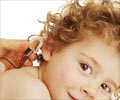Researchers by means of cochlear implant simulations have identified that infants process speech differently than older children and adults.

Dr. Andrea Warner-Czyz, assistant professor in the School of Behavioral and Brain Sciences, said this is the first study to show that infants process degraded speech that simulates a cochlear implant differently than older children and adults, which begs for new signal processing strategies to optimize the sound delivered to the cochlear implant for these young infants.
Cochlear implants, which are surgically placed in the inner ear, provide the ability to hear for some people with severe to profound hearing loss. Because of technological and biological limitations, people with cochlear implants hear differently than those with normal hearing.
Two of the major components necessary for understanding speech are the rhythm and the frequencies of the sound. Timing remains fairly accurate in cochlear implants, but some frequencies disappear as they are grouped.
Infants pay greater attention to new sounds, so researchers compared how long a group of 6-month-olds focused on a speech sound they were familiarized with -"tea"' - to a new speech sound, "ta."
The infants spent more time paying attention to "ta," demonstrating they could hear the difference between the two. Researchers repeated the experiment with speech sounds that were altered to sound as if they had been processed by a 16- or 32-channel cochlear implant.
Advertisement
The study has been published in the Journal of the Acoustical Society of America.
Advertisement









